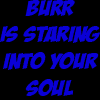
Well, I've finally gotten those poetic juices to flow. I guess I just had to wait a while, as I don't wish to force my poetry. ^^
Not too much to say here, except that this is an example of my new dialogue poems, or, as the title informs, a colloquy. They're essentially small plays. I got the idea to do them from that "epic ballad" you guys have been hearing me go on about. x3
I gotta say, I really enjoy the excitement of smooth meter and rhyme in brisk conversation. It's quite a challenge, but so worth it! =D
Enjoy!--and tell me what you guys think of this new format, for there are many more like this to come. ;D
P.S. (For those of you who may not know, Isaac Newton believed indigo to be one of the seven primary colors, but, because many people, scientist especially, couldn't discern that hue, some people don't acknowledge it.) =3
This has been a special broadcast of THE MORE YOU KNOW! :D
Until next poem! \(^o^)/
Not too much to say here, except that this is an example of my new dialogue poems, or, as the title informs, a colloquy. They're essentially small plays. I got the idea to do them from that "epic ballad" you guys have been hearing me go on about. x3
I gotta say, I really enjoy the excitement of smooth meter and rhyme in brisk conversation. It's quite a challenge, but so worth it! =D
Enjoy!--and tell me what you guys think of this new format, for there are many more like this to come. ;D
P.S. (For those of you who may not know, Isaac Newton believed indigo to be one of the seven primary colors, but, because many people, scientist especially, couldn't discern that hue, some people don't acknowledge it.) =3
This has been a special broadcast of THE MORE YOU KNOW! :D
Until next poem! \(^o^)/
Category Poetry / Portraits
Species Unspecified / Any
Size 112 x 120px
File Size 3 kB
I can distinguish indigo. It's one of my favorite shades :OP
And what a quirky fun poem. As a person from a scientific background, I know that sadly this kind of bickering is actually true to life in the research community XOD So, well done Sir D-Tail. You've caught us in all our follies
And what a quirky fun poem. As a person from a scientific background, I know that sadly this kind of bickering is actually true to life in the research community XOD So, well done Sir D-Tail. You've caught us in all our follies
Wow! The use of an actual conversation is quite an interesting spin on the poem. One I honestly have never seen before. Made reading it much more enjoyable.
The ending line "but where'd my precious indigo." Is my favorite. the way it uses go in two meanings chimes bells with me ^^ Well done as always.
The ending line "but where'd my precious indigo." Is my favorite. the way it uses go in two meanings chimes bells with me ^^ Well done as always.
Indeed, my epic ballad is going to be just like this, so I'm glad I was able to write something that gives my audience a glimpse of such future works. I'm glad to hear you enjoyed its effect. ^^
Hehe, and I do love words with dual meanings or that can be twisted around. I was afraid the ending would be too corny, so it's a relief to hear it's your favorite line. =D
I really appreciate the commentary, Nick. =3
Hehe, and I do love words with dual meanings or that can be twisted around. I was afraid the ending would be too corny, so it's a relief to hear it's your favorite line. =D
I really appreciate the commentary, Nick. =3
Interesting. Very interesting. Kind of makes me think of Shakespeare, which is always a good thing.
Obviously the final line is brilliance. I'm surprised nobody has mentioned how groan-worthy a pun it is.
Just a few things I've noted here and there.
1) The narrator speaks in lines of 86, as oppose to the 88 of everybody else. Nice touch.
2) "Good day, Sir Isaac Newton!" This line is only 7 syllables long, but considering the rest of the paragraph isn't rhymed like the others, I'm inclined to believe this intentional. Yes/No?
3) "Founded seven hues". I like the fact that the rainbow is his family, but founded strikes an odd note with me. You obviously don't want "sired", because that kills the second line of the poem. Adopted would work better, but the word is too long for the meter. Can you explain that one to me? Why founded?
Great work, delightful and easy to read. Good to see you doing more poetry!
Obviously the final line is brilliance. I'm surprised nobody has mentioned how groan-worthy a pun it is.
Just a few things I've noted here and there.
1) The narrator speaks in lines of 86, as oppose to the 88 of everybody else. Nice touch.
2) "Good day, Sir Isaac Newton!" This line is only 7 syllables long, but considering the rest of the paragraph isn't rhymed like the others, I'm inclined to believe this intentional. Yes/No?
3) "Founded seven hues". I like the fact that the rainbow is his family, but founded strikes an odd note with me. You obviously don't want "sired", because that kills the second line of the poem. Adopted would work better, but the word is too long for the meter. Can you explain that one to me? Why founded?
Great work, delightful and easy to read. Good to see you doing more poetry!
Mmm, Shakespeare; I can dig that. ^^
You think the final is "brilliance"?! Wow, I've never been given a positive comment to that degree before. I didn't think a pun would get that much praise. Hehe, well, I guess I should be grateful that it didn't ruin the poem. ^^;
*reviews your notes*
1.) Indeed, indeed! To give it that story feel within a play, I decided to give the narrator the traditional ballad voice. It also helps separate him from the actors. Keen observation. ;3
2.) Keeping it sharp, I see! That was quite intentional. It must seem unusual for some of my regular readers, because, as a perfectionist, I don't like loose ends in the meter; however, for that particular stanza, I felt the need to end it abruptly, seeing as the speaker was agitated. I like to think it works. =P
3.) Your structural analysis of this poem ceases to astound me, Zev! True, "sired" would have meaning-issues later on, and "adopted" is indeed too many syllables. However, "founded" was actually the FIRST word that came to mind because, though I'm treating the spectrum as his family, I still wanted to keep it scientific.
Also, "adopted" would mean that Newton merely took them in, not discovered them himself. Now, there's also the thought of--if someone "founded" something, of course they would raise it as their own; however, the colors may be his children, but they essentially belong to everyone! =D
Throughout the poem, I oscillate between science and family: the use of "light" in place of (photo), the use of "sister." Given the theme of the poem, I can see why that might strike you as odd; it's like I'm jumping in and out of the metaphor. Hopefully this is an acceptable explanation. x3
*whew*
Well, that was a workout! Your commentary is very much appreciated, Zev! \(^o^)/
Thank you. ^^
You think the final is "brilliance"?! Wow, I've never been given a positive comment to that degree before. I didn't think a pun would get that much praise. Hehe, well, I guess I should be grateful that it didn't ruin the poem. ^^;
*reviews your notes*
1.) Indeed, indeed! To give it that story feel within a play, I decided to give the narrator the traditional ballad voice. It also helps separate him from the actors. Keen observation. ;3
2.) Keeping it sharp, I see! That was quite intentional. It must seem unusual for some of my regular readers, because, as a perfectionist, I don't like loose ends in the meter; however, for that particular stanza, I felt the need to end it abruptly, seeing as the speaker was agitated. I like to think it works. =P
3.) Your structural analysis of this poem ceases to astound me, Zev! True, "sired" would have meaning-issues later on, and "adopted" is indeed too many syllables. However, "founded" was actually the FIRST word that came to mind because, though I'm treating the spectrum as his family, I still wanted to keep it scientific.
Also, "adopted" would mean that Newton merely took them in, not discovered them himself. Now, there's also the thought of--if someone "founded" something, of course they would raise it as their own; however, the colors may be his children, but they essentially belong to everyone! =D
Throughout the poem, I oscillate between science and family: the use of "light" in place of (photo), the use of "sister." Given the theme of the poem, I can see why that might strike you as odd; it's like I'm jumping in and out of the metaphor. Hopefully this is an acceptable explanation. x3
*whew*
Well, that was a workout! Your commentary is very much appreciated, Zev! \(^o^)/
Thank you. ^^
I like your poems! That said, I want to contribute to color science discussion!
I've never been able to see indigo either, at least as a distinct shade. I can usually tell the difference between violet and purple though! The number of colors you see seems to depend on who you are and how you grew up; some languages use the same color for blue and green (or blue and black).
We use 3+1 pigments to perceive color (one for low light and three for full color perception). That's why you can do a lot with three primary colors (for paints or printing or displays). Most of the time the three colors are towards the middle of the spectrum so all the most common and most readily distinguished colors are the most visible, but very low reds and especially most violets can't be represented this way (they have to use purple to approximate violet, because the way your brain interprets color makes those two colors look similar). Color blind people can see fewer colors because they have fewer eye pigments.
Many birds have more pigments and various features in their eyes to see in color, so they have a really stunning color perception. That's part of why so many birds have such colorful plumage.
I've never been able to see indigo either, at least as a distinct shade. I can usually tell the difference between violet and purple though! The number of colors you see seems to depend on who you are and how you grew up; some languages use the same color for blue and green (or blue and black).
We use 3+1 pigments to perceive color (one for low light and three for full color perception). That's why you can do a lot with three primary colors (for paints or printing or displays). Most of the time the three colors are towards the middle of the spectrum so all the most common and most readily distinguished colors are the most visible, but very low reds and especially most violets can't be represented this way (they have to use purple to approximate violet, because the way your brain interprets color makes those two colors look similar). Color blind people can see fewer colors because they have fewer eye pigments.
Many birds have more pigments and various features in their eyes to see in color, so they have a really stunning color perception. That's part of why so many birds have such colorful plumage.
Ah, well thank you very much, Wuwei! ^^
And really?! I had know idea there was such complexity to the perception and nomenclature of color. =O
I'm especially surprised to hear about avian color perception--that's an impressive explanation for their vividly colored feathers. =D
The insight is greatly appreciated! 8)
And really?! I had know idea there was such complexity to the perception and nomenclature of color. =O
I'm especially surprised to hear about avian color perception--that's an impressive explanation for their vividly colored feathers. =D
The insight is greatly appreciated! 8)
Quick and savvy back-and-forth dialogue? It's as if Aaron Sorkin wrote poetry! Only it's about science and the color spectrum, and contains a groaner of a pun, and the characters aren't walking briskly down a hallway... ok, perhaps it's not much like Aaron Sorkin's writing at all, but it's still a great colloquy and a fun read!

 FA+
FA+



![[Com] Portable Green #2](http://t.furaffinity.net/4039397@200-1277085612.jpg)




















Comments